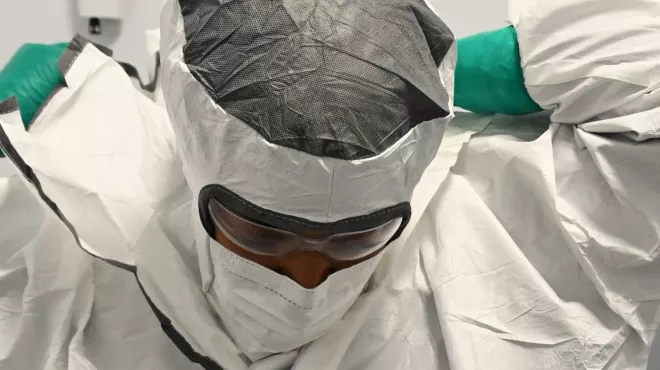While Novartis scientist Diana Graus Porta was researching an experimental therapy for hepatocellular carcinoma (HCC), the most common form of liver cancer, a close friend of hers was dying of the disease. He was in his early 70s, but was active and engaged in life. “The disease changed all that,” says Graus Porta, a translational researcher at the Novartis Institutes for BioMedical Research (NIBR) in Basel, Switzerland.
At that time, the only treatment available for his advanced disease caused debilitating side effects. He had to stop treatment and died about a year after his diagnosis. “He never had a chance to consider something new,” Graus Porta says.
Now, however, Graus Porta and her colleagues are testing their experimental therapy, called FGF401, in human patients. Clinical trials began in December 2014 in the US, Europe, and Asia. FGF401 is among the first experimental therapies for liver cancer that specifically targets a biological process that helps the cancer grow. In April, Graus Porta and her team shared early results at the American Association for Cancer Research annual meeting.
Targeted cancer therapies have helped patients with other forms of cancer, such as breast and lung cancer, by specifically blocking the biological processes driving tumor growth. For HCC, however, there are no approved therapies specifically against a single target or mechanism that drives the cancer in the liver.
“The disease is largely still treated with one-size-fits-all therapies,” says Dr. Richard Finn, a liver oncologist at the University of California Los Angeles.
Liver cancer is the fifth most common form of cancer worldwide, and the third most common cause of death by cancer, according to the Centers for Disease Control and Prevention. It can be treated with surgery if it is diagnosed early, but often it is not. Patients with advanced disease often die less than a year after diagnosis.
The risk of liver cancer increases with liver damage caused by other diseases, such as hepatitis viruses and metabolic disorders such as obesity and diabetes. In Asia, for instance, hepatitis B infections often go untreated and are passed through families. Rates of liver cancer there are about 30 percent higher than in the US, according to a 2011 New England Journal of Medicine report. In the US, rates of liver cancer are increasing as rates of liver taxing metabolic disorders rise, says Finn.
He never had a chance to consider something new.
Diana Graus Porta, Translational Researcher, Novartis Institutes for BioMedical Research (NIBR) Basel, Switzerland.
To meet the pressing need for new liver cancer therapies, Graus Porta and her colleagues launched efforts to find new liver cancer targets several years ago. Early on, a joint effort between Novartis and the Broad Institute of Harvard and MIT revealed vulnerabilities in a range of types of cancer. The study, completed in 2012, found that HCC sometimes depends on a family of receptors called Fibroblast Growth Factor Receptors (FGFR). These receptors act like antennae on the tumor cell surface, picking up growth signals. Blocking that signaling could stop the cancer from growing.
Further research at Novartis suggested that a single receptor, FGFR4, might be the most important one. Normally, a protein called FGF19 signals FGFR4 to regulate the production of bile acid, which the liver creates to aid digestion, and to help the liver regenerate itself. In some cases of HCC, the signal is amplified and fuels tumor growth.
Acting on these findings, Graus Porta and her colleagues developed an agent that aims to very specifically block FGF19/FGFR4 signaling. Their first tests of the agent slowed the growth of liver cancer cells grown in mice. “We saw great activity,” she says. “We thought we might be onto something.”
They got even more excited when they tested the compound against tumor fragments taken from human patients and grown in mice. They tested 40 unique HCC samples. The ones that responded to the therapy were the ones with amplified FGF19/FGFR4 signaling, the agent’s target.
“The biology and this pathway is important in some forms of liver cancer” says Andrea Myers, Clinical Program Leader at NIBR in Shanghai, a new research campus committed to discovering and developing new interventions for diseases that are common in China, such as HCC.
Based on these results, the team launched the Phase I/II clinical trial of FGF401 in 2014. The trial, which is still underway, has recruited over 65 patients in the US, Europe and Asia with an average age of 61.
Still, not all cases of HCC depend on this pathway for growth, so the team is committed to learning how to identify patients who are most likely to respond to FGF401. “We don’t want to miss patients who could benefit from this agent, and we don’t want to give it to patients who might benefit from something else,” says Myers.
The team is also looking at liver cancer holistically to see if a combination of FGF401 with an experimental immunotherapy from Novartis targeting PD-1 might work, says Myers. Tumors use the PD-1 pathway like an invisibility cloak to prevent the immune system from attacking them. From a scientific perspective, the PD-1 inhibitor generally aims to prevent cloaking and to allow the immune system to participate alongside FGF401 to treat the tumor.
For Graus Porta, the commitment is stronger than ever. She wasn’t able to help her friend, but she sees the potential to help many others.
A Novartis experimental drug in clinical trial aims to block liver cancer growth
EverNov, a subsidiary of Everest Medicines, has entered into an exclusive global licensing agreement to develop and commercialize Novartis’ novel FGFR4 (fibroblast growth factor receptor 4) kinase inhibitor, FGF401. This agreement complements our efforts to advance definitive medicines for patients who need them most. We have prioritized resources to advance other assets in our portfolio and believe that EverNov is well suited to continue the development of FGF401.



